If you are a professional Linux user then you might already know that the Nginx and the Apache server both are useful for demonstrating your project under a localhost or a public domain. Before you go to the next stage of the server, you might need to know the difference between the load Nginx balancer server vs the Apache server. The Apache is widely used for or regular user interface to base service for HTTP and HTTPS servers. On the other hand, the Nginx server can handle the server load and balance the traffic of your server.
Both of these servers are capable to keep your site up without having any downtime issues. There is no solid straightforward answer that I would give you like, this one is better than another. The performance depends on why you need it, how you use it, and how many users are using your site. However, we will see some neck and neck races, that will help you to decide who approached the final lap first.
Why Do We Need The Nginx or Apache Server?
If you’re a Python programmer or a Node Js developer, you might also think of creating your server or site with these tools. But, the Django or the Node Js was not originally built for maintaining high load servers or keeping the servers up for twenty-four hours.
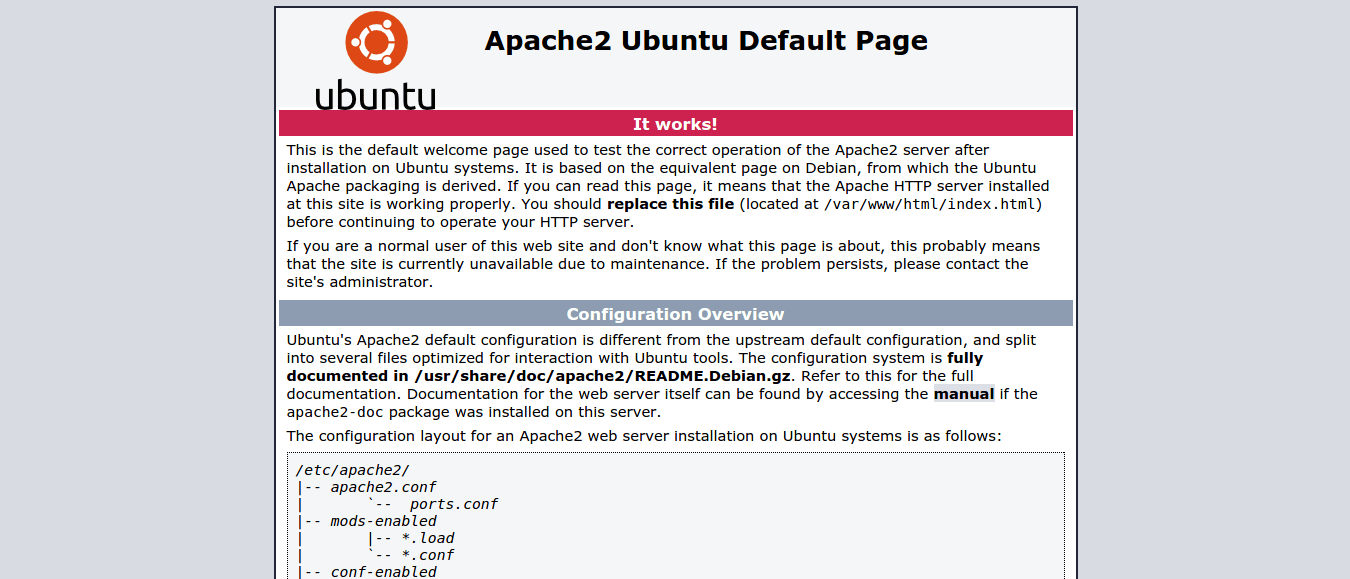
Here comes the notion of Nginx and Apache, which can host the server professionally with no downtime. Using Nginx or Apache also can make your site robust and less vulnerable and less hackable. Most importantly, unlike Django or Node Js, Apache or Nginx does not force you to define the network port with the address.
Furthermore, inside Apache and Nginx they both have built-in security features and the optimal capability of serving static files with no coding from the user end. Even they also allow you to create a virtual server to host multiple sites inside one single server.
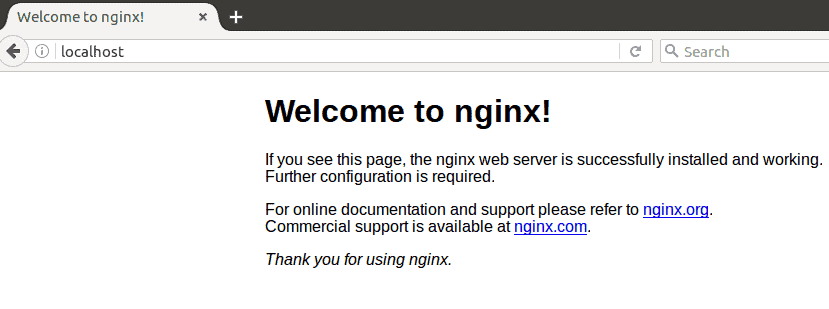
To wrap up, the main reasons we need to use Apache or Nginx are, they ensure server security, zero downtime, load balancing, reverse proxy server, and compatibility.
Nginx vs Apache
Both Nginx and Apache servers work smoothly on Linux and other servers. Based on the specifications of your system and server traffic, you can choose any of the servers between Nginx and Apache.
For fixing errors, server maintenance, and system enlargement, Apache is preferable for most users. On the other hand, for handling traffic, applying proxy servers, and approaching multiple clients, the Nginx works better. In this post, we will see the main user case, similarity, and the difference between Nginx vs Apache.
1. Apache vs Nginx: Syntax
If you’re a programmer and a server admin, you might already know that starting a new server from the scratch is always very hard. But, if the language is helpful and the syntaxes are easy to understand.
Compared to the length of the script, in Nginx, you can make the code shorter, less complex, and quick. On the other hand, Apache has some predefined library functions that can help you to make your code writing easy.
However, the coding style of Apache is a bit old-fashioned and the XML-style file is huge to load and handle. With a nifty coding script, the Nginx must win the Apache vs Nginx debate.
2. Configuration of the Server
After you install the server, you will definitely need to configure the server with your host machine and the domain. In Apache, there are a variety of options to set up and configure the server. You can set the htaccess file on Apache to define your rules and parameter.
Like Apache, the Nginx does not have any htaccess file for configuration. In fact, the Nginx requires less configuration than Apache. Nginx comes in a pre-configured way where the users hardly need to do a lot of configuration. However, you can edit the Nginx.conf file from the host drive to make changes to your server configuration file.
3. Apache vs Nginx: Ease of Use
With both Apache and Nginx, you can run python, Node Js, and other applications. But, the deploying method of script and apps are easier in Nginx than Apache. You can easily debug codes, implement Django applications, and other python apps easily on the Nginx server. It’s also quicker to install WordPress CMS on Nginx than Apache.
4. Documentation and Community Support
In terms of community support and documentation, the Nginx definitely wins the war of Apache vs Nginx. The Nginx has better files, tutorials, and organized files that can help and guide the users to get started with the server.
On the other hand, the documentation of Apache is a bit unorganized and tough to understand for newbies. Furthermore, Nginx also proves paid courses to teach people how to make the server more effective for users.
5. Apache vs Nginx: Security
In the war of Apache vs Nginx, both of the servers are equally safe and secure to use. In addition, f you’re using a Linux machine, your system is entirely secure. You can also write your server scripts to protect the server from DDoS attacks. Since the Nginx has a better smaller script with modern syntaxes and short loops, you can make your script better and more secured.
6. Apache vs Nginx: Platform
You can run Apache server on all Linux and Unix-like operating systems. And, it also supports Windows servers. On the other hand, the modern Nginx is supported by all new versions of Linux and Unix, and not all versions of Windows Nginx.
7. Apache vs Nginx: Connectivity
In Apache, the client requests are processed by multiple threads. Whereas Nginx uses a dedicated thread management system for approaching the client’s request. This is why when multiple requests arrive on Apache, it kinds is not able to handle it well. But, with a load balancing system, Nginx can handle requests as many as possible.
Please note, if your system has only one thread it can not handle more than one request at a time. But, with the same single thread, Nginx can respond to multiple requests simultaneously.
As of Apache servers contents in a dynamic way, it can deliver both dynamic and static content to the client from the server. But, on Nginx, you will need to add some additional plugins to deliver dynamic content. The good thing about Nginx in terms of delivering static content, it can deliver static content 2.5 times faster than Apache.
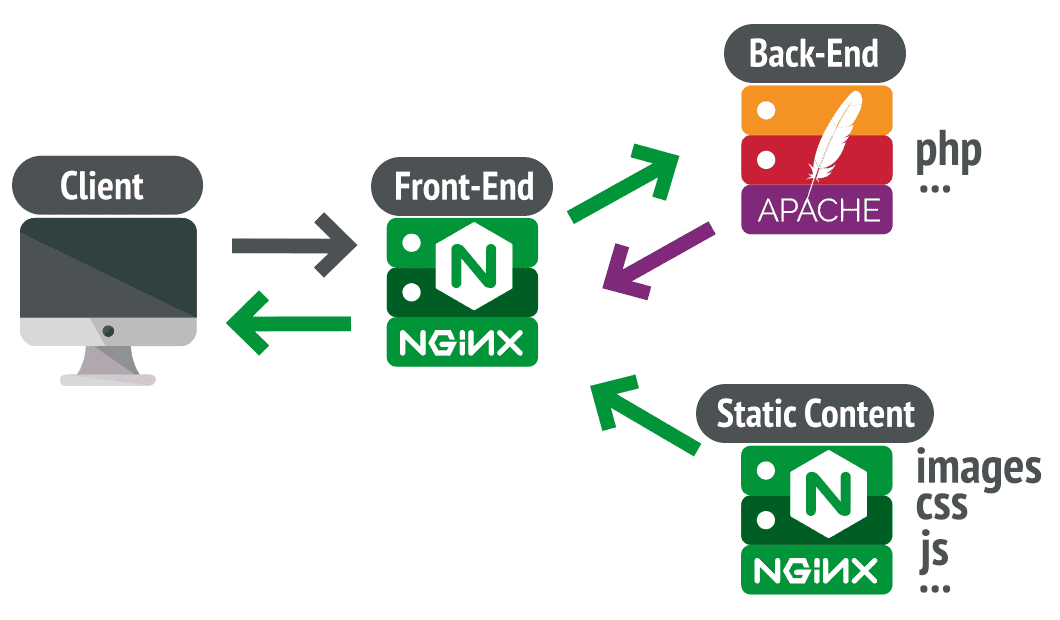
Apart from that, the way the Nginx and Apache respond to the client’s request is also different. Here are the basic request interpretation scripts for both Apache and Nginx. The Apache requires a virtual host to set the available sites; while, on Nginx, you can directly set the port, IP address, and other parameters. if you’re a programmer, looking into the interpretation scripts, you will find the differences between Nginx and Apache.
Nginx Script of Request Interpretation:
server {
listen 80;
listen [::]:80;
root /var/www/ubuntuPIT.com/html;
index index.html index.htm index.nginx-debian.html;
server_name ubuntuPIT.com www.bytesbuzz.com;
location / {
try_files $uri $uri/ =404;
}
}
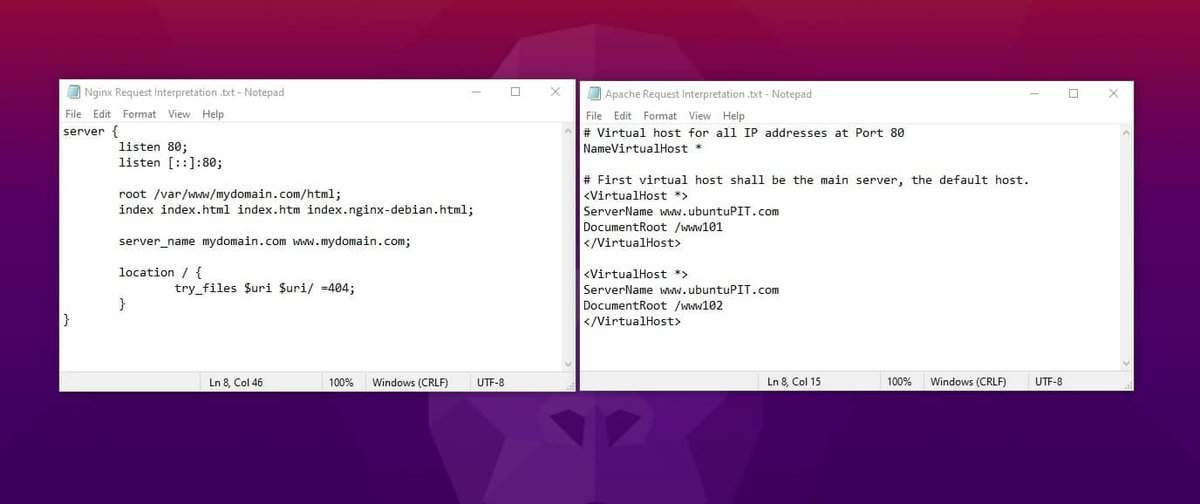
Script of Apache Request Interpretation:
# Virtual host for all IP addresses at Port 80 NameVirtualHost * # First virtual host shall be the main server, the default host. <VirtualHost *> ServerName www.bytesbuzz.com DocumentRoot /www101 </VirtualHost> <VirtualHost *> ServerName www.bytesbuzz.com DocumentRoot /www102 </VirtualHost>
8. Proxy or No Proxy: Load Balancer and Reverse Proxy
When it comes to using the tool as a server, you might need to know that both Apache and Nginx can act as web servers and proxy servers. Now, we widely know that Nginx is better for proxy and reverse proxy servers. But, Apache has a feature called the ‘gateway server’ that can also act as a proxy server. However, in terms of configuring a proxy server, I personally prefer to go with the Nginx.
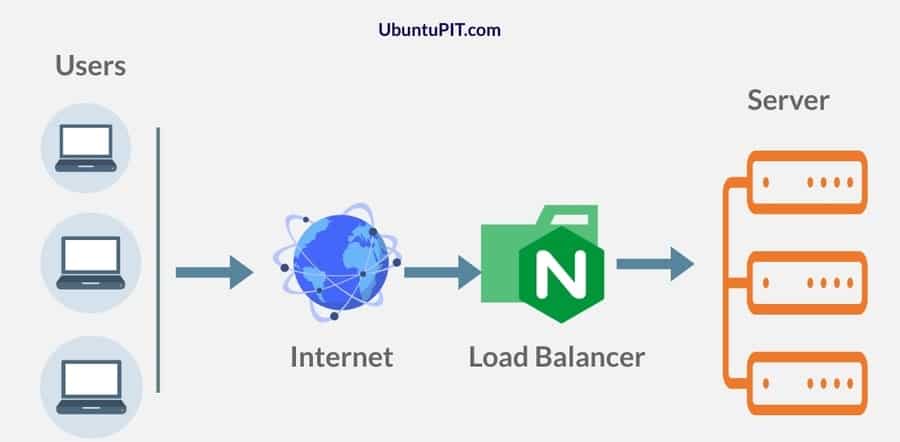
9. Apache vs Nginx: Server Caching
The server caching means to pre-load the files for the user on the server’s memory before the client asks for the files. This is a very efficient way to enhance the user experience from the server. Both Nginx and Apache support server caching in a very dynamic way.
Since we already know that the Nginx is a proxy and reverse proxy server, it already has the feature of caching files. Even more, if the Nginx server is set up in one single standalone server, the caching speed is faster. It can cache deliver both static and dynamic files to the users.
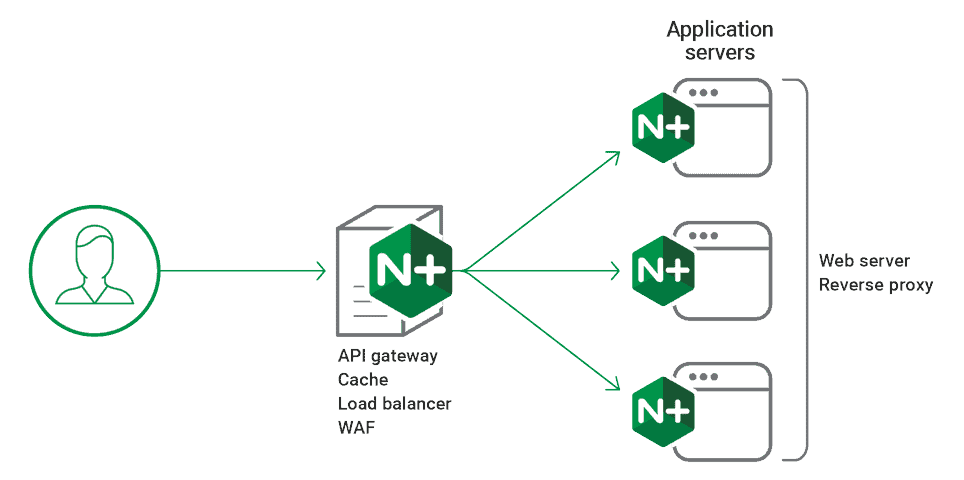
On the other hand, the Apache server has a mod_cache plugin that allows the users to cache files on the server. The cache controlling system was first introduced in the HTTP 1.1 version. In this case, the HTTP header plays the key role to get the file cached. The caching headers are run by the expires, pragma, and the content-control keys in the Apache HTTP server.
Later, the user can also create browser caching from the user-end. With greater bandwidth and low latency, HTTP caching, application caching, Memcached services are very popular in Apache. Furthermore, cache validation and invalidations are also easy in the Apache server.
10. Apache vs Nginx: Modules
Both Nginx and Apache have an arrangement where you can get modules to make the server more functional and usable. From a general point of view, the Apache server has a log of in-built and unofficial modules. On the other hand, you can load third-party modules.
But there is no need to say that Apache wins just because it has some built-in modules, the Nginx modules are safe and secure to use, and your server can’t be hacked through these 3rd party modules as they don’t have the access to the server’s core files.
11. Market Share and Trending
Last, but not least, if we look at the business growth and market share of these two tech giants, we can see how much their market share is. The below data chart shows how much the market share, website user, and google search trends are for Apache and Nginx.
Apache Vs Nginx Market Share:

Here is the data of website and server users of Apache and Nginx:
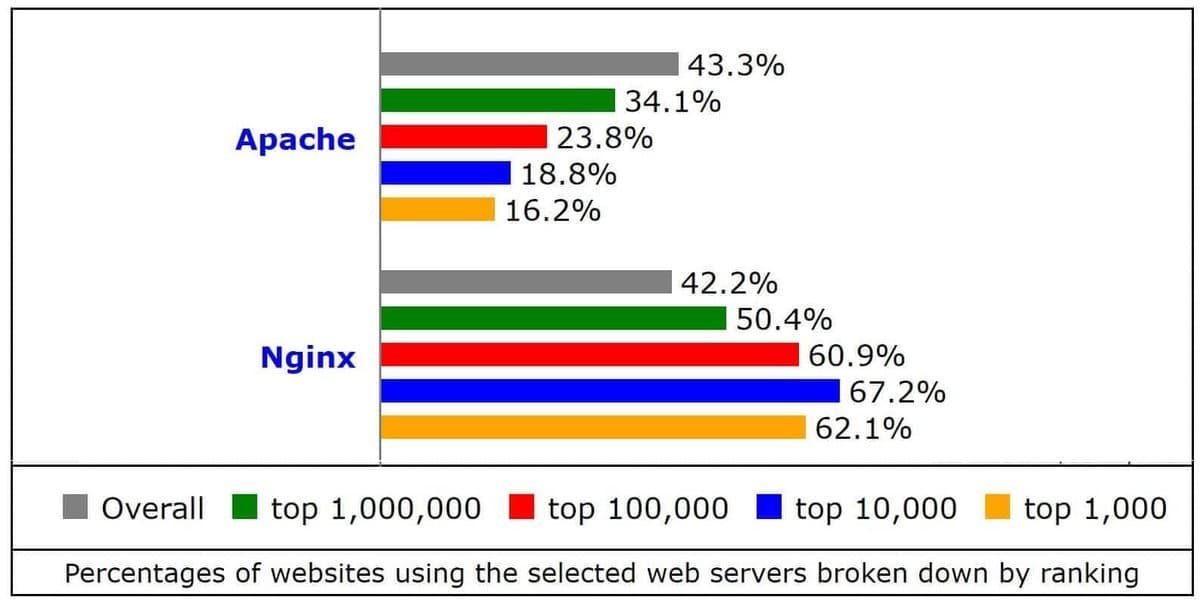
Apache Vs Nginx Google Search Trends:
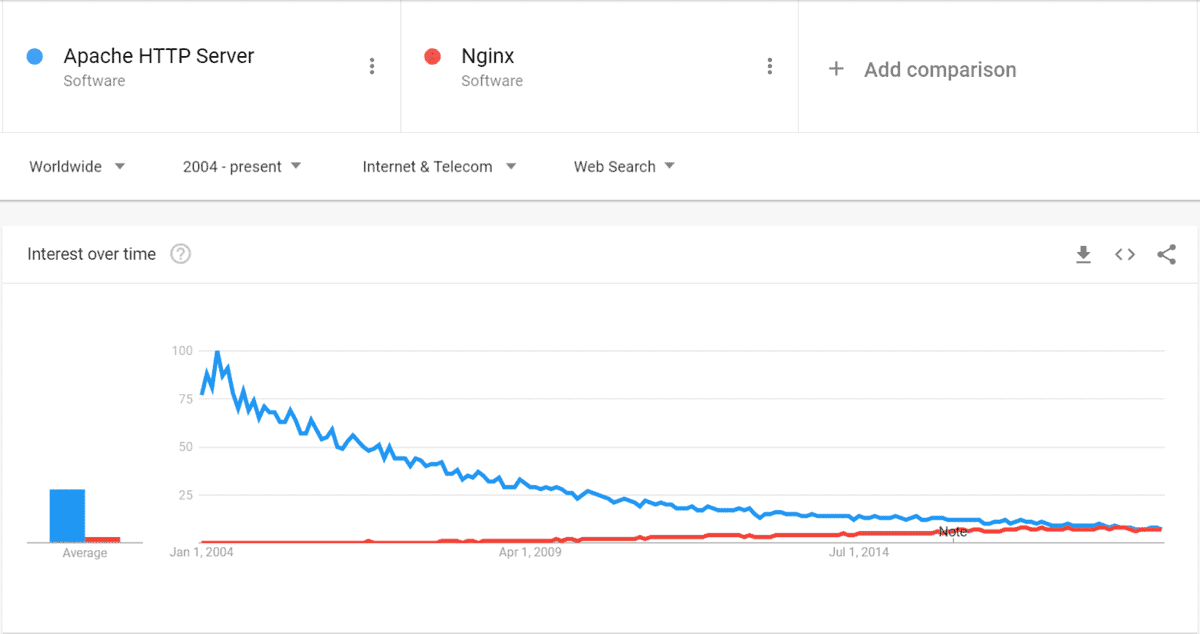
Final Words
In the long debate of Apache vs Nginx, we have gone through a few popular parameters and discussed head-to-head comparisons. No matter, which server you’re using or choosing, make sure you’re skilled in that particular server engineering. Both Nginx and Apache can be effectively used for making your server robust and secure. Both of them have pros and cons. It’s genuinely hard to declare one as the winner between these two.
If your existing server is slowing down the site and takes a longer time to load; instead of switching the server, you might also consider checking your script or codes and making it shorter. Often, we use to write longer scripts and make more loops in the code that takes longer time for the server to read the code.
In the entire post, I have explained all the points with brief descriptions and illustrations to make the concept clear of Nginx and Apache. If you find this post useful and informative, please share this with your friends and the Linux community. You can also write down your opinions about this post in the comment section.
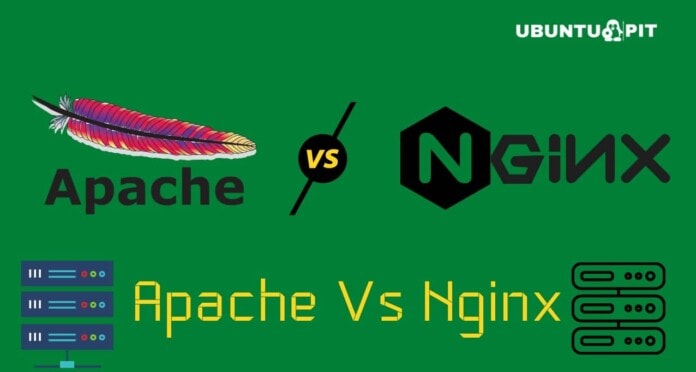
Apache uses a process-driven approach and creates a new thread for each request. Whereas NGINX uses an event-driven architecture to handle multiple requests within one thread.